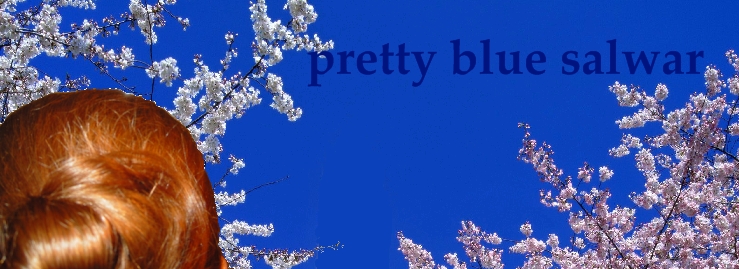I teach an "introduction to directing" class as part of my graduate assistantship. At the beginning of the semester, I sat my students down and told them that everything I needed to learn about directing, I learned from Alice in Wonderland.
There's a picture, somewhere, of a three-year-old Blue in a polyester nightgown with Garfield printed across the front. It's Christmas morning in Tempe, Arizona. I had just received my first real copy of Alice's Adventures in Wonderland and Through the Looking Glass -- a blue paperback Puffin. Inside are not only the two novels, but a handful of essays, poems, author's notes, and the famous diagram in which Carroll explains how his chess problem works.
(I say "first real copy" because prior to that I had owned a "fake copy;" a picture book based on the Disney movie which came with an audio cassette that read the story aloud. I used to put on the cassette and run around the house in my own little blue dress and white pinafore, acting out the story as it played.)
Anyway. I still have the blue Puffin, although this past Christmas I received Martin Gardner's Annotated Alice to supplement it, and to serve as my go-to for this Hyderabad project, because I think if I opened the paperback copy one more time, the pages would crumble and fall to pieces. The back is already covered with tape, and new tape to hold down the yellowed tape, and my favorite chapters have long since peeled away from the book's spine.
I don't know why Alice -- that is, why I was so attracted to this book, more even than Peter Pan or The Lion, the Witch and the Wardrobe or any of the other books I loved as a child. Possibly because Alice was young and clever and a girl, like me; possibly because I was attracted to Carroll's sophistication even before I knew what it was (the book, after all, is not at all written "for children" and is a complicated network of puns and allusions); possibly because the book taught me things, like logic and poetry and chess.
Possibly because the unique magic of this book is that it can be read in two entirely different ways -- the completely literal way, as it would be read by a three-year-old who thinks "glory" does in fact mean "a nice knock-down argument" because that's what it says on the page, and the analytical way, as it would be read by someone who's solving for the chess puzzle and who understands the subtle references to Tennyson and Wordsworth and Disraeli. And the magic is that with every passing year and every rereading, one can make a new discovery and shift from the former to the latter interpretation.
It could also be because the director in me loved the film adaptations. There are currently more than twenty different films based on the Alice stories, and I've seen about half of them (the ones I haven't seen are out of print or too obscure to be found). I told my directing class that everything I needed to learn about being a director I learned from watching Alice, and it's (at least partially) true -- after sampling these films one learns a great deal about staging, action, mise-en-scene, tempo, rhythm, casting, literal-vs.-non-literal storytelling, etc. etc. etc.
One also learns -- and very quickly -- that there's no one way to tell a story, which I think is something that gets lost in current teachings about theatre and the focus on the "right" or "best" interpretation.
Prior to this project I've created three stage adaptations; a musical based on James Thurber's The Thirteen Clocks, a play-with-music based on Choderlos De Laclos' Les Liaisons Dangereuses, and a play-set-to-music based on Alice in Wonderland. The Thurber and the Alice adaptation were both given public performances; the De Laclos became an unstaged project, although some of the music was performed "in concert."
I've always kept the twenty Alice films close to mind when I've worked to adapt a piece of literature for the stage, and they were of course immediately present when I began to write the adaptation for Hyderabad...
(I'm going to leave that as a cliffhanger for you, as there is still other work for me to do tonight, but the rest of the story will follow shortly. ^__^)
Sunday, April 1, 2007
Alice, Part One: My Relationship with the Text
Subscribe to:
Post Comments (Atom)



1 comment:
Really looking forward to how you work the process from start to finish. I think it will be very educational for aspiring filmmakers :)
Post a Comment